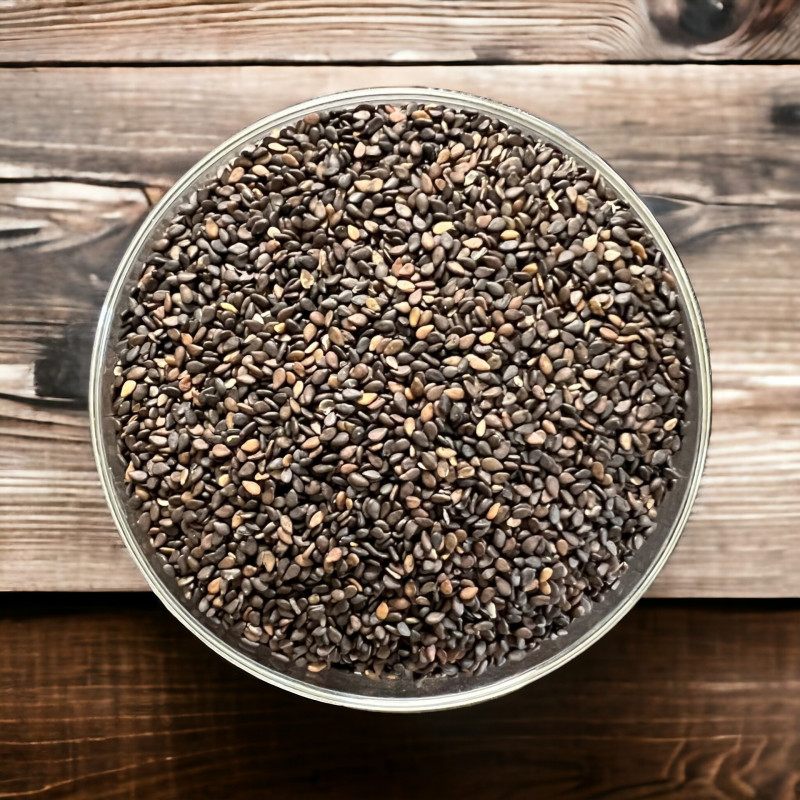
Reference: 12N7949601


Its taste is mild with a pleasant nutty flavor, and it adds a delightful crunch.
You’ll enjoy it in salads, vegetables, meats, on bread, and with fish.
 Delivery
Delivery
Mondial Relay
 Returns
Returns
See conditions
 Payments
Payments
100% secure
Product delivered in a resealable bag
°°°
 Black sesame seeds are delicious when added to salads, meats, or sautéed vegetables. They can also be mixed into bread dough, along with other seeds like flax, or simply sprinkled on top, such as on hamburger buns.
Black sesame seeds are delicious when added to salads, meats, or sautéed vegetables. They can also be mixed into bread dough, along with other seeds like flax, or simply sprinkled on top, such as on hamburger buns.
Extremely popular in cooking for their crunch and nutty flavor, sesame seeds (black, white, and golden) are increasingly used. This is a great habit for health, as these small seeds are packed with benefits. Whole seeds can also be consumed sprouted.
Considered a superfood by nutritionists, sesame seeds—whatever their color—are typically eaten raw or cooked and have numerous therapeutic and dietary benefits.
Sesame is very popular in Asian cuisine, and its light flavor is enhanced when toasted. The simplest way is to dry roast them in a pan for 2 minutes. They can also be used as a breadcrumb substitute to coat fish cubes, for example, which can then be fried in oil. This gives your dish a slight Asian flair!
Sesame has been valued since ancient times for its memory-enhancing properties, its richness in minerals (magnesium, iron, zinc, etc.), and its antioxidants, as well as for its fiber content, which aids in regulating digestive transit.

Origin: Paraguay
Scientific name: Sesamum indicum
Common names: Benne, benj
Black sesame is a unique variety, a cousin of the "classic" sesame. It has a more intense flavor and a crunchier texture. Its striking black color is highly appreciated in cooking, and it is even richer in nutrients than white or golden sesame seeds.
It is credited with numerous medicinal properties (rheumatism, memory, cholesterol, etc.), making it a key ingredient in Asian medicine. Its richness in healthy fats also helps combat constipation and nourishes and repairs skin and hair.
These seeds also produce an oil commonly used in Asian cuisine in China, Korea, and Japan, for salads, soups, and certain fondues. In Vietnam, they are used in soft nougats. This oil is notable for its resistance to rancidity.
Unhulled seeds are particularly rich in calcium and phosphorus. They also contain other minerals in significant quantities, such as magnesium, zinc, and iron, as well as plenty of fiber. Lastly, they are high in vitamin E and antioxidants (lignans) that are as effective as those in flax seeds.
Sesame is an annual oilseed plant from the Pedaliaceae family, widely cultivated worldwide for its seeds. It can grow up to 1 meter tall, with leaves about 10 cm long and 5 cm wide, lanceolate in shape, and decreasing in size as the stem grows. Tubular flowers appear from May to July, most often white or pink, bell-shaped. These are followed by pods containing the tiny seeds, which are hand-harvested between June and October after the pods have dried.
Unlike many other food plants, sesame has been little modified by humans, retaining significant genetic diversity. This means that plants vary in size and resistance to diseases and pests, even from one region or field to another, offering great potential for genetic improvement by researchers.
Sesame is one of the most common allergens, with symptoms ranging from skin reactions to digestive or respiratory issues. Allergic individuals should strictly avoid sesame and products that may contain it.
In India, sesame seeds are considered a symbol of immortality.
°°°
In India, sesame is a symbol of immortality.
In China, sesame has been used for over 5,000 years, and it is referenced in *The Thousand and One Nights* tales with the famous phrase "Open sesame!" This likely originates from the sound the sesame pods make when they open, resembling a key turning in a lock.
***
Data sheet
Reference: 12N7949601
Reference: 2N7072401
Reference: 9N76632004
Brand: Epiciane
Reference: fenouilE
Reference: 2N7072401
Reference: 00033669-0001
Reference: 10M6741201
Reference: celerigraines
Reference: 124510
Reference: grainesaroussir
Reference: 20711101
Reference: coriandreE
Reference: 20703402
Reference: 11N7892701
Reference: 20701706
Reference: 9N76632004
Brand: Epiciane
Reference: 12N7949601

Its taste is mild with a pleasant nutty flavor, and it adds a delightful crunch.
You’ll enjoy it in salads, vegetables, meats, on bread, and with fish.